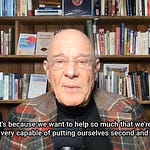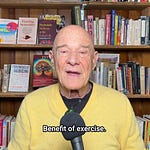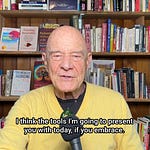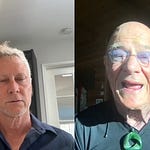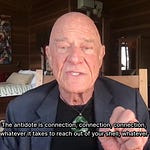I'm thrilled to share my recent interview with Dr. Ben Sessa, a leading figure in the field of psychedelic research and the author of The Psychedelic Renaissance.
Dr. Ben Sessa is a qualified medical professional who obtained his medical degree from University College London in 1997. He has been a member of the Royal College of Psychiatrists since 2002. With a specialization in Child and Adolescent Psychiatry from Oxford in 2005, Dr. Sessa has worked in various mental health services, including Child and Adolescent Mental Health Services and Adult Addictions and the Veterans Trauma Service. Dr. Sessa has held significant positions in the field of psychedelic medicine, including being a former co-founder, Chief Medical Officer, and Head of Psychedelic Medicine at Awakn Life Sciences from 2020 to 2023. He is trained in MDMA, psilocybin, and ketamine therapy.
In addition to his clinical work, Dr. Sessa is actively involved in drug policy reform and provides advice to the UK government. He has made regular media appearances, sharing his expertise in the fields of cannabis and psychedelic medicines. Dr. Sessa has presented at national and international conferences and has published extensively in both academic and popular press. For more information on his publications, books, and media inputs, please visit his website.
Dr. Sessa provides valuable insights into the history and current state of psychedelic research. We discuss the development of the field, from the early days of pioneering studies to the present psychedelic renaissance. He highlights the importance of patient demand and the need for alternative treatments in driving this resurgence.
Join me in this enlightening discussion as we dive into the realm of psychedelic research and its potential to revolutionize mental healthcare.
Golden Light,
Dr. Richard L. Miller
P.S. In the holiday spirit, I am discounting paid subscriptions by 20% until the end of the year. Subscribers get access to full transcripts. I am publishing this week’s transcript as a preview into the perks of being a member of our program. Please consider supporting us.
Mentioned in this Episode…
The Psychedelic Renaissance: Reassessing the Role of Psychedelic Drugs in 21st Century Psychiatry and Society by Dr. Ben Sessa.
Imperial College London study led by Dr. Robin Carhart-Harris on psilocybin therapy.
Study on psychedelics not linked to mental health problems or suicidal behavior.
Amanda Feilding's research at The Beckley Foundation related to psychedelics.
Listen to learn…
How did the psychedelic renaissance come about and what factors contributed to its resurgence?
What are the differences in stigma and clinical manageability between psilocybin and LSD?
Why are patients demanding alternative treatments and turning to psychedelics for mental health?
What are the potential benefits of psychedelic-assisted psychotherapy in revolutionizing mental healthcare?
How does the expansion of psychedelics beyond classic psychedelics, such as MDMA and ketamine, impact treatment preferences?
How does psychedelic use relate to creativity and inspiration in various artistic fields?
What are the myths and misconceptions surrounding psychedelics, and how can they be addressed through research?
What are the main findings of studies conducted by Dr. Ben Sessa and other researchers in the field of psychedelic science?
Seeking Psychedelic Testimonials: The Good, the Bad, and the Ugly.
We are currently looking for first-hand accounts of adverse effects of psychedelics—from ‘bad trips,’ to unwanted physiological complications, to abusive practices by guides, therapists, and shamans.
The interviews from this series will go into a forthcoming book on the topic—perhaps the first book its kind.
Please contact me if you would like to be interviewed. You can also leave us a voice message to share your story. We will keep your information anonymous unless you tell us otherwise.
My Books
Freeing Sexuality: Psychologists, Consent Teachers, Polyamory Experts, and Sex Workers Speak Out
Psychedelic Wisdom: The Astonishing Rewards of Mind-Altering Substances
Psychedelic Medicine: The Healing Powers of LSD, MDMA, Psilocybin, and Ayahuasca
Integral Psychedelic Therapy (co-edited with Jason A. Butler & Genesee Herzberg)
NOTE: The podcast is always freely available thanks to our paid subscribers. Please share this post to show your support for transparency. The following transcript distills the key points from this show into a condensed form. It is meant as a reference - listen to the full episode for an accurate rendition of the conversation.
Transcript
00:02:30 - Welcoming the Guest
Dr. Richard Louis Miller: Welcome to MINDBODY Health and Politics. I’m your host, Dr. Richard Louis Miller. The mission of MINDBODY Health and Politics is to enhance your physical and emotional wellbeing and encourage community. I say encourage community because I believe that we humans are basically tribal animals that like hanging around with each other and we like doing things together in groups. We like sewing circles, ball games, raves, watching television. We love eating together in circles. We are collaborative, cooperative as a species. But then you may ask, if that’s true, why is all of history written about the terrible wars and all the kills and how many tens and hundreds of millions of people we kill? And the answer is because a very small percentage of us, perhaps less than 5%, are predators. We see examples of this throughout all of history, whether it’s in ancient Egypt, whether it was when Caesar threw over the republic, Napoleon, Mussolini, Hitler, this Trump wants to be a dictator. It’s a different mentality. So those of us who are in the 95 plus percent who are collaborative and cooperative, we need to stay awake and aware. I leave you on this topic with the words of Thomas Jefferson, one of my heroes. He said, "Eternal vigilance is the price of liberty." Today on MINDBODY Health and Politics, I have the privilege of having as our guest, Dr. Ben Sessa. I’m holding up his book that just came out in a second edition, and right before the program, we were talking about a third edition, which is due because his first edition came out in 2012. He was part of the start of the wave of the psychedelic renaissance. His second edition, the one that I just showed to you, came out in 2017 and he was mentioning to me right before the program started that he is going to be doing a third edition. Welcome to MINDBODY Health and Politics, Ben.
Dr. Ben Sessa: Thank you very much, Richard. Great pleasure to be here. Thank you for having me.
00:05:00 - Early Psychedelic Research
Dr. Richard Louis Miller: One of the things that stood out for me in your book, of the many very important things, is this - I love your book, Ben. Let me just say that right out. I love the book. I think it's a great book. I think it's a must-read for anybody interested in psychedelics and even those who are not interested in psychedelics. But I'm a psychologist, and this is what caught my attention. In addition to what we’re going to be talking about, I'm going to read it out loud. This is how Ben Sessa ends the book. He thanks his wife because of the amount of time that it took to write the book, and he ends with, "Look, it's finished. I'm back again." I think that was his way of acknowledging. Tell us about that, Ben. I mean, it's a lot of work, isn't it?
Dr. Ben Sessa: Yeah, it's an immense amount of work and it's a lot of work staring at a laptop. And it does take one away from one's other activities, particularly family. So I think it's really important to acknowledge the kindness and patience of those who loved one to be patient and persevering and with support when academia takes us away so much from those important things. So, yeah, I love writing, but it is arguably an excuse to disengage from social activities, isn't it?
Dr. Richard Louis Miller: Yes. Well, it’s mostly a solo experience, although I’m about to launch a book for the first time with two other people, and you mentioned before the program that you are going to be doing your third edition with a partner or a colleague. So it’ll be an interesting, a new experience for both of us. Ben, and you, you talk in the book about how you and Robin Carhart-Harris, who I interviewed about a week ago, as an aside, it’s sort of a British invasion. Robin started it today. You and then David Nutt's coming on pretty soon as well, which I’m very pleased about. You mentioned in the book how you and Robin made this proposal for research. I think it was in about 2007, and you were turned down flat. It was like there was... Tell the story of that.d
00:07:00 - Reasons for the Psychedelic Renaissance
Dr. Ben Sessa: Which one are you talking about here? This is Robin’s study with psilocybin?
Dr. Richard Louis Miller: No, this was earlier than that. When you had met Robin and you put together some... I can find it in the book. You...
Dr. Ben Sessa: Oh yeah, this was originally for alcohol use disorder, wasn’t it?
Dr. Richard Louis Miller: Yes.
Dr. Ben Sessa: Yeah. I mean, back then, you know, Robin's study with psilocybin, which later became all the imaging stuff that came out of Bristol and Imperial, was the first psychedelic research in the UK. So there was no precedent for it since the sixties. And it did take a while to get ethics committees and boards on board with that sort of research. Of course, there's loads of it now and it's very easy. And people are familiar with accepting psychedelic protocols, but back then in the UK at least, we were very much trailblazing. There was nobody else that was proposing anything like this. And it was quite some years later that I managed to get my MDMA study off the ground. But Robin's work with psilocybin was absolutely paving the way. It was a very exciting time when it was myself and Robin and David and Amanda at Bristol and then Imperial in those early days.
Dr. Richard Louis Miller: And what do you think happened over there that led to an opening up? Did the political situation change? Did the culture change? Was there a change in morality? I mean, basically the two things that were sort of opposed to psychedelics were some combination of morality. You know, you're doing something bad. The same people who are sort of anti-alcohol in this country with the Women's Christian Temperance Union, only now it's something further out called psychedelics, right? Either that or fear that people are going to think too much and then they'll lose political power. Isn’t that a...
00:09:50 - Safety and Risks of Psychedelics
Dr. Ben Sessa: I think there are multiple reasons why we are in this psychedelic renaissance and why this is now happening this second time around. One is simply time. A lot of water's gone under the bridge since the 1960s. Most people today don’t even know who Timothy Leary was. I think the modern psychedelic researchers are steering away from the Leary-type narrative that psychedelics are going to save humanity and change the world. They’re not going to save humanity and change the world. Nothing is. The world’s way too complex for any single agent to do that. So the modern narrative, which is much more sober and conservative, is that these medicines could be useful in certain parts of psychiatry. That actually carries a lot more weight than this idea that we’ll all live in a Utopian dream if everyone just drops acid. So we don’t have that kind of messianic narrative, and I think that’s helped with this current renaissance. Another major reason for the Renaissance is changes in science. Using imaging techniques, we can produce beautiful, colorful pictures of the brain. We know a lot more about the receptor profiles and the neurobiology behind psychedelics that gives them a much more 'sciency' edge, which has popular appeal. The internet connectivity, you know, there’s far more happening today. People talk about the psychedelic sixties. Today is way more psychedelic than the sixties ever were. That’s a fraction of the people were using psychedelics in the sixties. There is far more widespread recreational use of all psychedelics today than there ever was in the sixties, but also much greater connectivity, far more clubs, groups, societies, gatherings, festivals, conferences, than ever before, way eclipsing anything in the sixties. And the final reason, and I think the main reason why psychedelic research has picked up clinically is that it’s driven by patient power. Richard, patients themselves are demanding alternatives to the current status quo in terms of clinical treatments, and they’re searching for alternative types of medicine and they’re sick of substandard treatments for the last 50 years in medicine. So they’re naturally reaching out to other more esoteric subjects, and psychedelics fit in really well with that.
00:12:30 - Focus on Psilocybin Over LSD
Dr. Richard Louis Miller: You were at the Psychedelic Science Conference in Denver last spring. I’m sorry we didn’t meet in person. I think we were in the same room at the same time at Amanda’s party outside the conference hall. I noticed a group of policemen and all around on the grass, with a lot of hippie-looking young people, sitting around in gay clothing. So I walked over to the police officers, and I introduced myself and asked them if I could ask a few questions, and they said, fine. I asked them point-blank, how did they feel? And I pointed at the people on the grass and the building and so on. I said, how do you feel about this conference on, from what your perspective is, drugs that we’re calling psychedelic science? How do you feel about it? And the chief of the five of them looked at me and said, "Every one of us has had a family member messed up by big pharma. If these people have something new to offer, we are going to be very interested." And I thought that was quite an interesting statement from the head of the police group. It’s basically what you’re saying, demand from the public.
Dr. Ben Sessa: Yeah, absolutely. And I think, you know, like I said, there’s a lack of safety and efficacy of traditional psychiatric treatments, and I think people also do feel as though they’ve been mis-sold the effectiveness of traditional psychiatric drugs, which are not effective in many cases and are certainly overused. So, that does all contribute to this groundswell of movement and enthusiasm for something alternative, and psychedelics fit so well into that.
Dr. Richard Louis Miller: Here in the States, it looks to me like most of the research is going on with psilocybin, and the decriminalization that’s occurred in Oregon. I want to, and in Colorado is a decriminalization of vegetables that come from the ground and fungi. LSD is clearly being left out of the picture. You, I, I don’t see anywhere near as much research, at least that I’m aware of. Are you aware of LSD research that’s there’s a resurgence in that as well, either in England or maybe in the United States that I’m not aware of? Or do you see also that the preponderance of it is psilocybin?
00:15:00 - Ranking Psychedelics by Preference
Dr. Ben Sessa: No, you're absolutely correct, Richard. There's been very little in the way of LSD research since this psychedelic renaissance of the last 20 years. Very little indeed. People are choosing psilocybin. There are a number of reasons for that. I think the main reason is psilocybin carries less of a stigma. If you're trying to get a protocol past ethics, and you have those little letters, LSD, the ethics committee jumps out of their seats immediately. Whereas if you write the word psilocybin, most of them haven't even heard what that is, and so it gets past ethics committees more easily. It doesn’t have the social stigma that LSD has. It’s also arguable that psilocybin is shorter acting, like six to eight hours as opposed to eight to 12 hours. So that makes it a bit more clinically manageable in the clinical protocols that people are writing. I think also the fact that it comes from a natural substance appeals to certain users as well over LSD. So you’re absolutely correct. There has been, I think, maybe two studies that came out of Switzerland. LSD, we did some brief LSD research in this country as well. That’s not found the light of day in terms of publication, but generally it’s few and far between, probably under half a dozen LSD studies in the last 20 years. That’s off the top of my head, I’m guessing, whereas hundreds of psilocybin, so you’re absolutely right in that observation.
Dr Richard Louis Miller: So you’re working at the hospital as a psychiatrist, which you are, and you’re told that you’re going to get 50 patients to treat over a period of time, and you have to use one of two psychedelic medicines for this particular time. But you can’t use both and you can’t mix them. You have to pick one of all the psychedelics. Which one would you pick?
Dr. Ben Sessa: Are you asking if I need to clarify what you mean by psychedelic? Are you referring only to classic psychedelics, or are you expanding that? Because I would expand it to a whole host of things that are not traditionally classic psychedelics.
Dr Richard Louis Miller: I would certainly expand it to MDMA and ketamine. What else are you thinking?
Dr. Ben Sessa: Well, I mean, there’s so many, there’s ibogaine, there’s salvia, I would argue THC with no balancing CBD is psychedelic. So there’s many, many, many. So, if we’re allowed to expand beyond the classic psychedelics with your thought experiment, MDMA all the way, MDMA all the way.
00:19:00 - Psychedelics and Creativity
Dr. Ben Sessa: In the last 15 to 20 years of the psychedelic renaissance, there have been so many textbooks. There are hundreds of new textbooks on the field, which is fascinating, and it's great fun, and I've written a fair few myself. But what there is a real lack of is fiction in psychedelic writing. Very few novels about psychedelics and psychedelic research. I have written a novel; it's called "Patient Chemistry," and it fictionalizes the use of psychedelic research for these two fictional characters. It's fantastic, and I'm looking for an agent and a publisher to bring this book into the public. So I wanted to put that to your esteemed listeners: if there are any agents or publishers out there who might be interested in perhaps one of the first books of fiction on psychedelics in modern times, drop me a line.
And there's been a lot of interesting work done over the years on that. Jim Fatman did a very famous study back in the sixties with Meslin, I think it was, and creativity. There has been a study with LSD in recent years in which I worked on. Again, it hasn't been published yet, which was looking at LSD in fairly small doses for improving creativity.
I think one of the things about psychedelic drug use and creativity is that it's a good primer to help a person be creative. I don’t think that many people produce particularly good material when high on drugs. Even bands like The Grateful Dead or other rock bands, they will talk about their use of psychedelics in the writing process and in the creative process. But when it comes to performing on stage, although probably not the Grateful Dead, but plenty of other bands, they're no good if they're high on stage. And similarly, visual artists will say the same. They'll say that their psychedelic experience improves their creativity and inspires them, but when it comes to putting pen to paper, they're better off doing that sober. Personally, I can't bear psychedelic visionary art. I think most of it is not my aesthetic. Pictures of airbrushed dolphins diving through rainbows with jaguars and condors in the background—it's cheesy as hell if you ask me, but a lot of people in the psychedelic community like that stuff.
00:22:00 - Psychedelic Myths
Dr. Richard Louis Miller: Well, talking about the word cheesy, on page 90 of your book, you have a picture of a couple and they’re sitting there with a couple of brains, and the caption says something like, they remove the brains and then they put them back in. I didn’t know what to make of that. What kind of brains and how do you put a brain back in? Were you kidding?
Dr. Ben Sessa: Okay, so this is Terry Krebs and Pal-Ørjan Johansen. Yeah, that was obviously a ridiculous joke. They didn’t remove any brains.
Dr. Richard Louis Miller: Well, you sure got my attention because you said here, it's so funny, I was laughing my head off. It says, which involved temporarily removing the brain of their subjects, examining them on the lab surface before reinstalling them into their subjects, and almost as if they’re human subjects.
Dr. Ben Sessa: No, they wrote a fantastic paper. It was a very large population study with thousands of patients, which looked at the relative physical and mental health of psychedelic users and found that they are superior to the general population, suggesting that far from psychedelics being dangerous, it’s in fact the opposite. People who regularly use psychedelics cautiously have better mental and physical health than non-users. So that was an interesting study.
Dr. Richard Louis Miller: Okay. Well, that leads me to another question, Ben.
Dr. Ben Sessa: Mm-Hmm.
Dr. Richard Louis Miller: We’ve all seen, or at least within our subculture, we’ve all seen the pictures that Amanda published of the brain on LSD and a brain not on LSD, the MRI photos, the famous photos now.
Dr. Ben Sessa: On psilocybin, I think it was.
Dr. Richard Louis Miller: Was it psilocybin?
Dr. Ben Sessa: Psilocybin? Is that the one with the circle and the connectivity between them?
Dr. Richard Louis Miller: It’s the one where the brain that's on psychedelics is all lit up orange, and the brain that’s not on psychedelics has some orange spots on it, but not a lot of them.
Dr. Ben Sessa: Okay.
00:24:00 - Interpreting Brain Imaging Research
Dr. Richard Louis Miller: I, well, my question, if you don’t remember it, then maybe it isn’t relevant, but I was going to ask you, as a neuroscientist, what is this telling us? What is your interpretation of seeing the brain ignited like this under the influence of this substance?
Dr. Ben Sessa: Well, what we see with psychedelics, classic psychedelics, what they appear to do is temporarily increase network connectivity and activity in such a way as there are connections between regions of the brain that normally wouldn’t be connected. This is often termed like neuroplasticity or neuro flexibility, and this massive, highly chaotic connection. It’s not a state you can live in the whole time. We need to have boundaries and rules and categories for our everyday life, or we wouldn’t be able to function. But for a few brief hours, the drug acts as a primer in which all these things are possible and everything’s connected. That’s very beneficial if you, during that therapeutic window of opportunity, hit the patient with bespoke focused psychotherapy. So in a way, the drug just acts as a primer to put the brain into this neuroplastic state. But it’s the psychotherapy that you do in and around that state that has the clinical value.
Dr. Richard Louis Miller: Ben, some people have found it helpful to differentiate the therapy that goes on with lower doses from higher doses, referring to the lower dose as psycholytic therapy and the higher dose as psychedelic therapy. Do you find that a handy differentiation?
Dr. Ben Sessa: Yeah. And I think it’s a dose-dependent issue, Richard. So if you take a low dose of psilocybin, like 5, 10, 15 milligrams, or a low dose of LSD, say 25 to 50 up to 75 micrograms, you could potentially do talk therapy in that state. Psycholytic means mind-loosening, so the mind is looser. It frees you up, it reduces inhibitions, and you can do psychotherapy in that low dose state. But if you take a high dose of psilocybin, 25, 30 milligrams, or LSD, 150, 200 micrograms...
00:26:30 - Different Forms of Psychedelic Psychotherapy
Dr. Richard Louis Miller: You have a mind-blowing mystical type experience, which is very psychedelic and full of material, but most people can’t really engage in psychotherapy in that state. So the difference between say psycholytic and psychedelic in this context is around dose really, and the extent to which you can do talk therapy or not on that dose, and both appear to be helpful.
Dr. Ben Sessa: Yeah, and if you look at the history and the work that Ronald Sandison was doing in the fifties in the UK, he was using psycholytic doses on a more frequent basis. So he would give doses of 25 to 50, maximum 75 micrograms, to his patients undergoing weekly psychoanalysis to sort of boost the psychoanalysis and do talk therapy in that drug state. Whereas the Psycholytic Psychotherapy School that was more popular in the States would give a single high dose, 200, 300, 400 microgram dose, have this mind-blowing mystical experience with very little psychotherapy at the time, and then you spend the weeks afterwards unpackaging and integrating that single high dose experience. So they’re just two different forms of psychotherapy.
Dr. Richard Louis Miller: Now, there’s a third form, if you will. Jim Fadiman, as you know, has been collecting hundreds, if not thousands, of stories from people who are microdosing. Given the positive effects that you are talking about from the psychedelics and this research indicating that people function even better who have taken the psychedelics regularly, could an argument be made for microdosing on a schedule very regularly, almost in the same way that pharmaceutical companies have people taking a pill once a day?
Dr. Ben Sessa: I have three opinions about microdosing. The first reason I’m not a big fan is there isn’t a huge amount of randomized control data around whether or not it’s working. The two studies that have been shown suggest that it’s a placebo or expectancy effect more than a drug effect. The second reason that I’m not a big fan of microdosing is clinically I’ve come across too many people who are not microdosing. They’re threshold dosing. If you threshold dose psychedelics every day for weeks and months on end, you tend to go a bit loopy. The third reason is that I like psychedelics because they get us off daily maintenance drugs. If you’re going to take psychedelics every day for weeks, months, years, you may as well be on Prozac. But the caveat there about microdosing is if you do it and you do it properly, you will report positive benefits because if you believe in it, it’ll work for you. It’s a positive thing if it gives you a personal sense of meaning and you believe it’s enhancing your connectivity and creativity. Carry on doing it.
00:31:00 - Frequency of Microdosing
Dr. Richard Louis Miller: Let’s talk about threshold dosing.
Dr. Ben Sessa: Mm-Hmm?
Dr. Richard Louis Miller: Jim has put forth that if a person takes two days off in between doses, the neurotransmitters have a chance to recharge and they’re ready. So a person could take a threshold dose on a Monday, take Tuesday and Wednesday off, and then take another threshold dose on Thursday or Friday, in other words, twice a week. Would that be enough to get them into the category of those that you cited in that study that had a more effective functioning baseline than people who were not taking the psychedelics?
Dr. Ben Sessa: I mean, if you are threshold dosing psychedelics twice a week, good luck to you. I don’t see how that behavior will make you more connected with others. My sense is that will move you away from connection with others and towards an insular sense of self. Psychedelics are best done infrequently. A heavy user of LSD might be twice a year. If you are taking psychedelics at a threshold dose very regularly, my anecdotal experience is that people drift away from being agents that create connection and move towards an insular sense of self that is not connected. These are not the sorts of drugs you need to take twice a week. They have much greater meaning and benefit when used sporadically and infrequently, unless everyone everywhere is doing it. Otherwise, you just start to become the odd one out as opposed to more being more connected.
Dr. Richard Louis Miller: What are your thoughts in the same regard then about the frequency of MDMA, which in distinction from the psychedelics, tends to be more emotional or heartful and brings you closer to people, not further away?
Dr. Ben Sessa: MDMA is similar. You can’t use MDMA every day; after about two or three days, it just stops working. If you are using MDMA every week or even twice a week, it becomes habitual and you start moving towards not being able to have fun or enjoy yourself without it. I don’t think that’s healthy. People can do what they want, but these things seem to be more effective and beneficial when they are used sparingly, on special occasions, not every week. It’s not even about the drugs; it’s just a boring activity. Broaden your life and do something else this weekend.
00:35:00 - Frequency of MDMA
Dr. Richard Louis Miller: Well, you’re echoing what Rick Doblin and Michael Mithoefer say about MDMA. I think they think like maybe once every three or four months is plenty. At the same time, I’m collecting data on couples who use it every single week and have been for five and 10 years, maybe averaging close to three times a month for five to 10 years. And so far, I don’t have a large N, but the results are remarkable. I’m seeing things like connecting with people who are estranged in the family, people who never talk to each other, getting back and talking to each other. People who didn’t talk about emotions, getting comfortable talking about them, and this is without a therapist, by the way. These are people self-experimenting.
Dr. Ben Sessa: Well, that sounds like fascinating data. That does sound really interesting. I would love to see that.
Dr. Richard Louis Miller: I, I’m not sure if you know Allan Ajaya, don’t you?
Dr. Ben Sessa: No.
Dr. Richard Louis Miller: Allan Ajaya is a psychologist in Wisconsin and a Buddhist priest. He’s taken LSD over 900 times. I said, “Allan, are you, have you had enough?” He said, “Oh, no. There’s always more to learn.” It's quite interesting.
Dr. Ben Sessa: Exactly. And how many people have had over 900 drinks of alcohol? Probably most of us. So, it seems like an unusual thing to do with LSD, but it’s a lot less toxic than alcohol, isn’t it?
Dr. Richard Louis Miller: Now that’s what’s leading me into my next area for us to talk about. In this country, we scare people, politicians in the media, scare people by citing data in a certain way. For example, we have 32,000 homicides in the United States every year with firearms, which is a frightening number. What’s not told to the public is that half of those are suicides. Almost 40% of the other half are in the family. And when you run the numbers for 330 million people, your chances of getting shot in the United States are one in 25,000. Well, if it was put forth to the public that your chance of getting shot in the United States are one in 25,000, it creates a different feeling. ’Cause when I cite these statistics to people and I say, would you do a surgery that would save your life if there was a one in 25,000 chance that the surgery would fail? Everybody says yes.
Dr. Ben Sessa: Yeah, well it’s that interesting way of looking at it, Richard.
00:39:00 - Assessing Risks
Dr. Richard Louis Miller: So what I’m about to ask you, Ben, is, can you cite the adverse effects of some of these psychedelics in reverse? Your chances of not dying with these psychedelics rather than your chances of dying or do both. In other words, give us both sides of the picture, because that’s one of the things that’s used to scare the public. Am I gonna die from these things? Can I smoke enough marijuana that it kills me? If I take psilocybin and I accidentally take too much, am I gonna end up dead?
Dr. Ben Sessa: Okay. Well, I can talk to you about the prevalence of morbidity or mortality of psychedelics. Absolutely. Or the safety of psychedelics is another way of stating it. Can I make a comment about American gun culture first?
Dr. Richard Louis Miller: Absolutely.
Dr. Ben Sessa: I don’t think America needs any further encouragement about the hideous medieval situation in which high-grade military machinery is in the hands of the general public. No other country on earth is as bad. It’s absurd. In terms of the safety of psychedelics, you know, the rest of the world thinks America’s crazy for this. They there’s no respect whatsoever for American gun laws, but I suppose within most straight-thinking American people, it’s probably the same, isn’t it?
Dr. Richard Louis Miller: Ben, I’m here to say out loud what other country does not have universal healthcare like the United States.
Dr. Ben Sessa: Do you know, I read yesterday that Malawi has a better public healthcare system than America and Malawi’s in one of the top five poorest countries in the world. You are better off getting sick in Malawi than you are in America.
Dr. Richard Louis Miller: Our country is in a slide. If you look at where we are in education, we used to be number one in the world. I think we’re down at number 18 now. 60% to 70% of our country, Ben, are obese or overweight. Johns Hopkins reports that between 30 and 40% of the United States are depressed or suffering from anxiety or depression. And that’s in addition.
Dr. Ben Sessa: It’s worrying, isn’t it? I hope there’s a reawakening of all these things. People are well aware of this data now, aren’t they?
Dr. Richard Louis Miller: I don’t know if we are or not, Ben, because when the public is downtrodden, obese, overweight, and depressed, they’re ripe for a dictator. And we have a dictator wannabe that is frothing at the mouth to take the controls.
00:43:00 - The Future of Psychedelic Medicine
Dr. Richard Louis Miller: I would love to hear about the safety of psychedelics and then if you want, the morbidity as well.
Dr. Ben Sessa: Morbidity’s really simple. Classic psychedelics like psilocybin and LSD are virtually inert physiologically. They do virtually nothing to the body, slight rise in blood pressure and heart rate, which is probably anxiety-related, not pharmacologically related. So, LSD and psilocybin have zero toxicity risk. To overdose on psilocybin mushrooms, you would need to eat 17 kilograms of fresh mushrooms, which is 85 supermarket boxes. The physical toxicity risks for classic psychedelics are virtually zero, and there have been virtually zero recorded deaths ever in history from physiological toxicity from classic psychedelics.
MDMA has a slightly higher toll on the body. It raises blood pressure, temperature, and heart rate briefly for about four to six hours. There are more recorded fatalities from MDMA poisoning than there are classic psychedelics, but it’s still very low. In the UK, maybe five to 10 per year. People can die from hyperthermia, hyponatremia. But all of those things are easily managed in a clinical setting. Physiologically, the psychedelics are very safe drugs.
Ketamine does have a strong addiction potential if used very frequently in a recreational setting. It also causes inflammation throughout the urinary tract, which heals by scarring and is irreversible. This doesn't happen in clinical protocols with ketamine, where moderate doses are used several weeks apart. But regular recreational ketamine use does have both addiction and physiological risks.
The most important thing in a clinical setting with screened patients and monitored guided sessions is that you can reduce all these harms down to virtually zero. They are very safe drugs to use, considerably safer than many drugs routinely given to psychiatric patients. When talking about safety in medicine, we don’t use words like safe or dangerous because they’re meaningless concepts. We say, does this treatment in this patient at this point satisfy the risk-benefit analysis in favor of benefit over risk? When you do that with psychedelics, whether MDMA, psilocybin, or ketamine, they come out very strongly in the favor of benefit over risk. Extremely safe.
Dr. Richard Louis Miller: Extremely safe. In your book, you have a picture of two scientists sitting with a subject who’s in a chair, and he’s being injected with DMT. That subject looks very suspiciously like Dr. Ben Sessa.
Dr. Ben Sessa: That is Ben.
Dr. Richard Louis Miller: Oh, okay. So was Dr. Ben Sessa getting injected with DMT?
Dr. Ben Sessa: Yeah, so I am in a very fortunate position, Richard, in that unlike anyone else I know, I can say on the record that I’ve had MDMA, psilocybin, DMT, ketamine, and LSD, all of those have been delivered in legal clinical or legal research settings. I’ve participated in studies with all five of those drugs and I can, on the record, say I’ve had all those drugs. I don’t know anyone else that has done all of those studies. I have indeed had intravenous psilocybin, intravenous LSD, intravenous ketamine, intravenous DMT, and oral MDMA, all of them legally.
Dr. Richard Louis Miller: And how would you rank those five in terms of personal benefit?
Dr. Ben Sessa: Personal idiosyncratic preference, which is just aesthetic, I’m not a huge fan of ketamine. I find it rather dark and spooky. Psilocybin, LSD are fascinating compounds to do sparingly for some incredible peak experience, but not too often. DMT similarly is something that you probably don’t need to do lots. It’s about glimpsing those aspects of self because they’re all internal experiences. MDMA is certainly my preference because as a clinical tool, it doesn’t have that mind-blowing peak experience that classic psychedelics have, but trust me, as a trauma therapist, it is no less powerful. It is much more tolerable, much easier to take. You don’t really have a bad trip with MDMA. It either works or it doesn’t. Very tolerable and easy to manage, yet no less powerful when it comes to its tool as an adjunct to psychotherapy. It’s immensely powerful in that role, but also very easy to tolerate as a patient. So, if it was a competition, it would be MDMA all the way in terms of choice for a clinical tool.
Dr. Richard Louis Miller: I’ve also had the experience of each of these five substances, though not in the way that you have, and I agree with you 100% on four of the five.
I agree with you on the benefits of the LSD and the psilocybin. Ketamine seems dark to me also. Of course, it’s an anesthetic and I’m interested in expansion, not contraction, and I don’t want to go to sleep. And I think MDMA, from the first time I used it, it was life-changing and remarkable. The only one we sort of disagree on is DMT. My experience with it is sort of like, okay, you get the transcendence, but where’s the meat and the potatoes? What do I take home other than the fact that I had a transcendent experience? So if you’re looking for a fast transcendent experience that lasts 15 to 20 minutes, sure, go for it. But as a therapist, I wouldn’t know how to use it.
Dr. Ben Sessa: Okay.
Dr. Richard Louis Miller: Terrific. There has been talk in this country, which I know you're aware of, of putting LSD in the water supply, and you mentioned in your book that it wouldn’t work because public water supplies are chlorinated and the chlorine would neutralize the LSD. If that’s the case, then why when we take LSD orally doesn’t the stomach acid, which is hydrochloric acid, neutralize the LSD?
Dr. Ben Sessa: That's a really interesting point, Richard. The point about the water supply adulteration with LSD is a classic psychedelic urban myth. LSD is quite volatile, and you would need truckloads pouring into a reservoir to create enough of a dose to be felt by drinking out of a tap. Also, only about 10% of the water that comes out of a tap is drunk. Most of it’s used for other purposes. So the idea of poisoning an entire town with LSD is just not going to happen. The one place where it might work is enclosed systems, like a ship, which has a closed system, smaller water reservoir. But anything on the National Mains for water supply, it's just not going to happen with LSD. The question about why we do not neutralize it in the stomach, I don’t know. You do lose a lot of the potency of LSD when you take it orally. That's why when we use it in research, we use intravenous because you get full delivery of the drug to the brain without any loss in the stomach or the gut. LSD is very volatile. If you dip a sheet of LSD blotter when you're making it, say you calculated it at 300 micrograms a tab, by the time it's dried, it's 150 micrograms a tab. It doesn’t preserve very well.
Dr. Richard Louis Miller: You make an important point in your book about the future of these psychedelics in medicine. I would add in creativity as well. And the point is what it’s going to take is money. The money to do the research and how this whole area has been a stepchild of science and medicine. Just as chemical dependence has been a stepchild of psychotherapy, there are these areas that are sort of looked down upon. In the United States, there are three areas which, if you study as an academician, are career killers: hypnosis, sexuality, and psychedelics. But now psychedelics is no longer a career killer. The other two, hypnosis and sexuality, are still career killers. You mention in your book it's going to take money and the way to get the money is through public relations, which I totally agree with. In fact, I did a whole book called "Psychedelic Wisdom," which contains 1500 years of prominent people outing themselves in the way you're asking us to do. They're telling the story of 30 to 40 years of self-experimentation. Now, how do we do that, Ben? Are there organizations in England that are taking you seriously enough that they’re considering public relations, manifestos, public relations?
00:57:00 - Conclusion
Dr. Ben Sessa: I think there are organizations that are taking this seriously, and the real challenge for psychedelics going forward is that we don't need any more psychedelic research. We know they work, we know they're safe, we know they're efficacious. We know they work on multiple patient indications. What we need is good PR, good advertising, politicians, and dissemination of this idea. We need psychedelics in free public healthcare. If all we've achieved after years and millions of dollars pouring into the industry is high-end, glamorous, exotic retreats for very rich tech hippies, we have failed. These drugs need to be free public access for everybody. Then we can make a serious dent in the massive international psychiatric epidemic of mental illness. They can revolutionize public health services in terms of mental healthcare, but they need to be accessible to all. They should not be charged. It makes economic sense. They're not only the right moral, ethical, and clinical thing to do, they're also the right financial thing to do. There's nothing more expensive than the untreated psychiatric patient. If you cut corners by not adequately treating them early in life, they go on to not work, they're on disability benefits, they need new legs, new livers, they offend, they go to prison, their children are taken away by the family courts. All of the millions of dollars of costs that go with substandard psychiatric treatment. Whereas if you treat them effectively with psychedelic medicine, yes, it's expensive, yes, it's intensive upfront, but that's like surgery. We should not be looking at it as a palliative care subject that just keeps people managed in their symptoms for the rest of their life because we don’t want to spend the money upfront in an effective treatment that will cure them and get them better. Psychedelic therapy is turning on its head this maintenance model of psychiatric care that we’ve had for the last 50 years. Psychedelics are a marketing nightmare for the pharma industry. We need to find a way to make this available to patients for free. It would pull the rug out from under traditional pharmaceutical services. There is a place for SSRIs and mood stabilizers, but they’re certainly overused and ineffective in many people. So I think psychedelics, that is the challenge for the future. We don’t need any more research. We just need to get these into public healthcare so they’re accessible to all. Then we can really make a meaningful dent in public health.
Dr. Richard Louis Miller: I think it’s a perfect way to end our interview. That was so beautifully said. Thank you, Dr. Ben Sessa, for being with us today.
Dr. Ben Sessa: Thank you, Richard. It's been a great pleasure to be here.
Dr. Richard Louis Miller: Thank you all gentle listeners for being with us today on this broadcast of MindBody Health and Politics with our very distinguished guest, Dr. Ben Sessa from England. I remind you that all of our programs are open source. That means no charge, no hidden costs. Go to mindbodyhealthpolitics.org. You can listen to this interview with Dr. Ben Sessa. I hope you’ll buy his book, "The Psychedelic Renaissance." It’s worth reading and I look forward to seeing you again. Remember, every Tuesday at nine o’clock is a new program. Until next time, this is Dr. Richard Lewis Miller reminding you that good health is worth fighting for, and it’s essential for life, liberty, and the pursuit of happiness.




